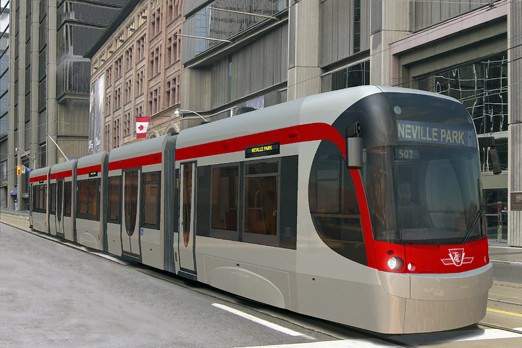The City of Toronto’s decision to reduce its order of 185 light rail vehicles by 25 per cent won’t have a significant impact on the local Bombardier plant, says an area MPP.
Toronto Mayor Rob Ford and Ontario premier Dalton McGuinty announced Thursday a $12.4 billion Toronto Transit Commission deal to replace the Transit City project, which entailed installing light rail lines all over Toronto and would have had Thunder Bay’s Bombardier plant producing potentially 368 light rail vehicles.
The new plan would see a new underground subway line and the Transit City light rail tracks scaled back from 52 kilometres to 25 kilometres, leaving only 130 of the 185 light rail vehicles already ordered from Bombardier still needed.
MPP Bill Mauro (Lib. Thunder Bay – Atikokan) continued to be optimistic about the change because Bombardier still had 75 per cent of the work as well potential other contracts such as with GO Transit.
“That’s very good news,” Mauro said on Friday. “My message to the community is this; this is still a very busy, very active plant that has work for years and year to come. In regards to the totality of what’s been announced and what’s going on, this is not a large reduction.”
Mauro said it was important to note that the reduction was from 185 light rail vehicles not 368, which was only a potential number.
The province provided about $770 million for the original 185 order and the main part of that order is still going forward, he said.
With plans to build more subway cars, Mauro added he would be lobbying to have Toronto fill much of that order at the Thunder Bay Bombardier plant.
Thunder Bay Chamber of Commerce president Harold Wilson said he’s still concerned what kind of impact the changes will have on Thunder Bay but wanted to look on the bright side. Local content for the contract sits at about 25 per cent but during the original negotiations, the Chamber of Commerce wanted closer to 50 per cent to have a greater economic impact.
With these new changes it might be possible to increase the local content at the Bombardier plant, he said.
“The flip side of this for us is to make sure that local content is higher than it was,” Wilson said. “That was something that we were fighting for. That was a huge issue for us. This is the time for local content, which should have been much higher. I think (raising the local content to 50 per cent) has to be looked at so it’s a win for everyone.”
At the moment of the Chamber of Commerce wants to know what options are available before it goes forward with any action, which could mean potential penalties for making changes to the contract, he said.
Sign in or register
- Messages
- Post a Listing
- Your Listings
- Your Profile
- Your Subscriptions
- Your Likes
- Your Business
- Support Local News
- Payment History
Registered Users
Already have an account?
New Users
Create a free account.
